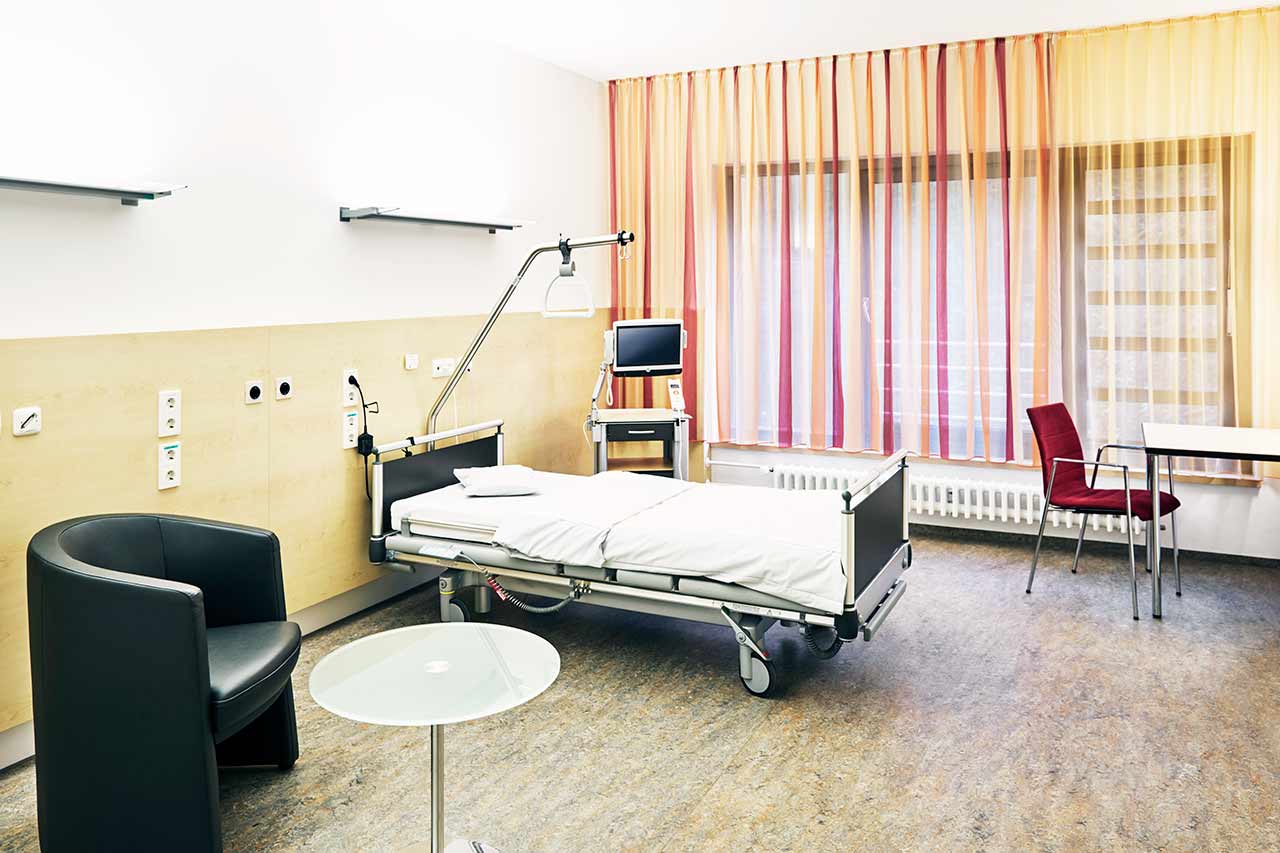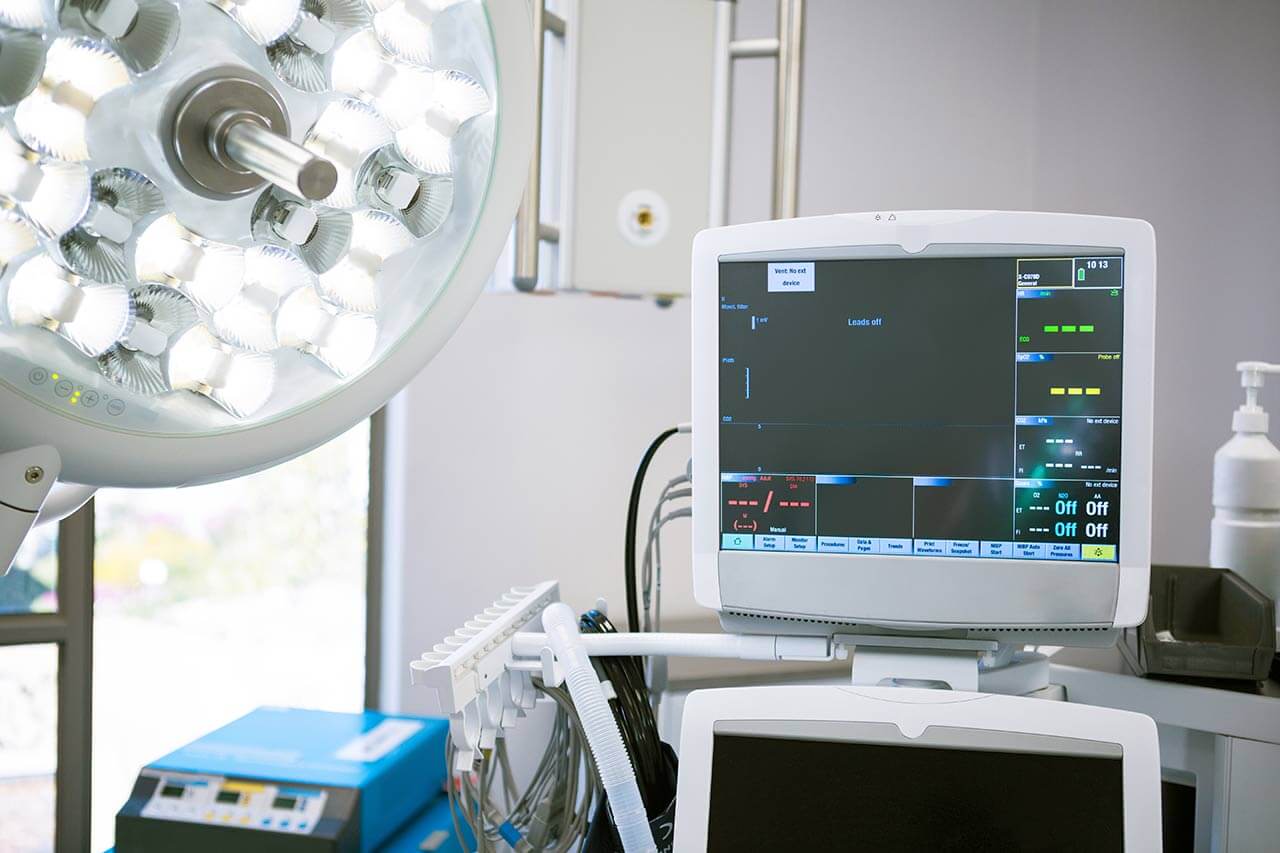
The program includes:
- Initial presentation in the clinic
- clinical history taking
- review of medical records
- physical examination
- laboratory tests:
- complete blood count
- biochemical blood analysis
- inflammation indicators (CRP, ESR)
- indicators of blood coagulation
- TSH-basal
- blood gas analysis
- antinuclear antibodies (ANA)
- rheumatoid factor titers (RF)
- chest x-ray examination
- bronchography
- high-resolution computed tomography (HRCT)
- collected three sputum samples
- pulmonary function test
- bronchoscopy
- bronchial lavage
- nursing services
- consultation of related specialists
- development of individual treatment plan
Required documents
- Medical records
- Chest X-ray, MRI/CT scan (if available)
Service
You may also book:
 BookingHealth Price from:
BookingHealth Price from:
About the department
The Department of Adult and Pediatric Gastroenterology, Endocrinology, Infectology, Nephrology, Cardiology and Pulmonology at the Hospital Oberberg Gummersbach offers the full range of diagnostic and therapeutic services in these medical specialties. The healthcare facility admits patients of all age groups. Many diagnostic and therapeutic procedures are performed on an outpatient basis. The department's team of doctors specializes in the treatment of diseases of the gastrointestinal tract, diabetes mellitus, infectious diseases, and pathologies of the kidneys, heart, and respiratory system. The department has modern diagnostic rooms fitted out with equipment for ultrasound, X-ray, electrocardiography, echocardiography, and endoscopic examinations. During treatment, individually developed drug therapy regimens are most often used. Patients with end-stage renal insufficiency are offered renal replacement therapy (dialysis). For this purpose, there is a dialysis unit with 10 beds. The department's nephrology team also provides preparation and follow-up care after a kidney transplant. The department's doctors strictly adhere to current clinical protocols and are always open to personal communication with the patient, trying to best satisfy their individual needs and wishes. The department is headed by PD Dr. med. Robert Hoffmann.
The primary clinical focus for the department is the diagnosis and treatment of diseases of the digestive system, including liver, gallbladder, and pancreatic pathologies. The department operates a cutting-edge endoscopic unit that performs more than 4,000 diagnostic and therapeutic endoscopic procedures for adults and children every year. Typically, endoscopic procedures are performed under anesthesia using Midazolam or Propofol. The dosage of the drug is determined depending on the complexity of the upcoming manipulation. The hygiene standards in the department's clinical practice meet the highest requirements of the German Society for Gastroenterology, Digestive and Metabolic Diseases (DGVS) and the European Society of Gastrointestinal Endoscopy (ESGE). In addition, compliance with these standards is regularly monitored by external, independent organizations. In the endoscopic rooms, the physicians of the department most often perform such therapeutic procedures as mucosectomy, polypectomy, endoscopic hemostasis, ligation, and sclerotherapy for esophageal varices, peroral endoscopic submucosal myotomy for achalasia cardia, argon plasma coagulation, and many others.
An important part of the department's clinical practice is the medical care of patients with diabetes mellitus. The health of patients with this endocrine disease is in the safe hands of experienced specialists who have received training in accordance with the requirements of the German Diabetes Society (DDG). Once the diagnosis is confirmed, the patient receives structured recommendations for lifestyle modifications. These play a very important role in compensating for diabetes mellitus. To make it easier for patients to accept the diagnosis and the medical and social aspects associated with it, the department's physicians provide comprehensive information to patients and their families. The main task is to maintain a high quality of life. The department's doctors provide consultations to patients with type 1 diabetes mellitus (adults and children), type 2 diabetes mellitus, and gestational diabetes mellitus, as well as to patients using insulin pumps. Depending on the type of diabetes mellitus and the characteristics of the disease, the department's clinicians prescribe the optimal treatment regimen. This may include classical insulin therapy, intensive insulin therapy, supplemental insulin therapy (SIT), basal-supported oral therapy (BOT) in combination with oral hypoglycemic agents, or continuous subcutaneous insulin infusion (CSII).
Patients with infectious diseases are treated in an isolation ward with 8 specially equipped beds. The head physician of the department personally supervises a specialized outpatient section for patients with chronic hepatitis B and C. Most often, patients receive drug therapy with antibiotics, antifungals, antivirals, and other drugs.
The department also regularly treats patients with kidney diseases. The medical facility has all the necessary resources for comprehensive diagnostics: laboratory tests (for example, special urine tests or advanced blood tests), imaging tests (for example, sonography, color duplex scans, and CT or MRI scans), and kidney biopsies. In addition, the department conducts immunological tests. The department specializes in the treatment of both primary kidney diseases (for example, glomerulonephritis) and secondary pathologies of the nephrological spectrum (for example, diabetic nephropathy, nephrosclerosis due to arterial hypertension, and immunological and rheumatic diseases with kidney damage). Renal replacement therapy is available in the department for acute and chronic renal failure. The department performs more than 5,000 dialysis procedures annually, which demonstrates the unique experience of specialists in this field. The dialysis unit has 10 beds with modern dialysis machines from the famous Braun company. Nephrologists also have at their disposal the Fresenius GENIUS system, which is used in intensive care, classical dialysis, and continuous renal replacement therapy. In addition, the following modern blood purification procedures are successfully performed here: plasmapheresis, immunoadsorption, and leukocyte apheresis.
The department also offers cardiology services. Specialists in this medical field provide comprehensive diagnostics of the cardiovascular system and conservative and interventional catheter-based treatment of heart disease. The department has a Chest Pain Unit to provide emergency medical care for acute coronary syndrome, heart failure, life-threatening arrhythmias, and other acute conditions. Intensive hemodynamic monitoring and therapeutic measures are performed here. In addition to stress ECG, stress echocardiography, and 2D and 3D echocardiography, the department offers cardiac MRI, for example, for suspected organic myocardial lesions, myocarditis, coronary heart disease, and other heart pathologies. The department uses catheter-based techniques to implant advanced single- and dual-chamber pacemakers to treat life-threatening arrhythmias.
Diagnosis and treatment of acute and chronic diseases of the lungs and other respiratory organs complete the range of medical services of the department. The department's specialists are particularly interested in the treatment of patients with infectious lesions of the lungs and various forms of bronchial asthma.
The department's range of medical services includes the following:
- Gastroenterology
- Diagnostics and treatment of gastrointestinal diseases
- Drug therapy
- Endoscopic therapeutic procedures
- Mucosectomy
- Polypectomy
- Hemostasis (stopping bleeding)
- Ligation and sclerotherapy for esophageal varices
- Bougienage for esophageal stricture
- Peroral endoscopic submucosal myotomy for achalasia cardia
- Argon plasma coagulation for angiodysplasia, angioectasia, and tumors
- Endoscopic foreign body removal
- Percutaneous endoscopic gastrostomy with subsequent monitoring
- Diagnostics and treatment of gastrointestinal diseases
- Endocrinology
- Diagnostics and treatment of diabetes mellitus
- Individual lifestyle modification programs for diabetes mellitus (nutrition consultations, training in glucose control, etc.)
- Classical and intensive insulin therapy
- Continuous glucose monitoring
- Continuous subcutaneous insulin infusion (pump therapy)
- Supplemental insulin therapy (SIT)
- Basal-supported oral therapy (BOT) in combination with oral antihyperglycemic agents
- Diagnostics and treatment of diabetes mellitus
- Infectology
- Diagnostics and treatment of infectious diseases (special focus on chronic hepatitis B and C)
- Drug therapy with antibiotics, antifungals, antivirals, and other drugs
- Diagnostics and treatment of infectious diseases (special focus on chronic hepatitis B and C)
- Nephrology
- Diagnostics and treatment of primary and secondary kidney diseases
- Renal replacement therapy (dialysis)
- Hemodialysis
- Peritoneal dialysis
- Continuous venovenous hemodiafiltration
- Continuous ambulatory peritoneal dialysis
- Special blood purification procedures
- Plasmapheresis
- Immunoadsorption
- Leukocyte apheresis
- Renal replacement therapy (dialysis)
- Diagnostics and treatment of primary and secondary kidney diseases
- Cardiology
- Diagnostics and treatment of heart disease
- Drug therapy
- Interventional catheter-based treatment of arrhythmias
- Electrical cardioversion
- Implantation of single- and double-chamber pacemakers, as well as subsequent monitoring of their operation
- Diagnostics and treatment of heart disease
- Pulmonology
- Diagnostics and treatment of respiratory diseases
- Drug therapy
- Endoscopic therapeutic procedures
- Videobronchoscopy
- Bronchoalveolar lavage
- Pleural drainage in the treatment of pleurisy and pneumothorax
- Pleurodesis
- Diagnostics and treatment of respiratory diseases
- Other diagnostic and therapeutic services
Photo of the doctor: (c) Klinikum Oberberg GmbH
About hospital
The Hospital Oberberg Gummersbach is a medical complex that offers its patients top-class personalized care. The hospital was founded in 1985. Since then, it has earned an excellent reputation in the German medical arena and has gained vast experience in the provision of medical care to foreign patients. The Hospital Oberberg Gummersbach is an academic hospital of the University of Cologne, thanks to which doctors and professors at the medical center have the opportunity to participate in promising research projects of national and international significance. The hospital has 536 beds for patient stays. The medical team consists of more than 1,400 employees. Their main focus is always on the patients and their individual needs and wishes.
The hospital has 13 departments and 7 highly specialized centers. The hospital offers various fields of modern medicine, including general and abdominal surgery, thoracic surgery, oncology, hematology, gastroenterology, nephrology, neurology, orthopedics, traumatology, gynecology, mammology, radiation oncology, otolaryngology, and others. Diagnostic and treatment facilities, as well as operating rooms at the hospital, have state-of-the-art medical equipment, including devices for imaging tests, navigation systems, equipment for endoscopic and minimally invasive interventions, and laser technologies.
Highly qualified doctors and competent nursing staff work with patients. The specialists take care of patients' health around the clock, and they are always open to personal communication and ready to provide support. The primary goal of every employee at the medical facility is to provide accurate diagnostics and the most effective treatment. At the same time, important attention is also paid to the humane and respectful attitude towards patients.
The hospital has a strict quality control system: in 2003, the medical facility was certified according to KTQ requirements, and since 2014, it has been certified according to DIN EN ISO 9001:2008 standards. The Breast Center, the Colon Center, the Oberberg Cancer Center, the Arthroplasty Center, the Stroke Unit, and many other structures of the medical facilities have been certified. Patients can thus be assured of receiving high-quality medical care using the very latest technologies.
Photo: (с) depositphotos
Accommodation in hospital
Patients rooms
The patients of the Hospital Gummersbach Oberberg stay in comfortable rooms designed in light colors. The patient rooms include an automatically adjustable bed, a bedside table with a pull-out tray, a wardrobe, a table and chairs for receiving visitors, and a TV. The hospital has access to Wi-Fi. Each patient room has an ensuite bathroom with a shower and a toilet.
The hospital also offers enhanced-comfort rooms. These patient rooms have a refrigerator, a safe, and upholstered furniture. The bathroom includes a hairdryer, a bathrobe, toiletries, and towels.
Meals and Menus
The patient and the accompanying person are offered a daily choice of three menus. If, for some reason, you do not eat all the foods, you will be offered an individual menu. Please inform the medical staff of your food preferences prior to treatment.
Further details
Standard rooms include:
Accompanying person
The accompanying person may stay with you in the patient room or at the hotel of your choice during the inpatient program.
Hotel
You may stay at the hotel of your choice during the outpatient program. Our manager will help you choose the best option.





